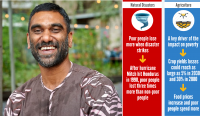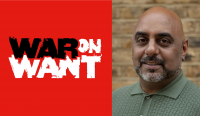David Goeßmann interviews Kevin Anderson at the Climate Summit in Glasgow (COP26).
At COP26 in Glasgow not a single country offered a climate plan that is in line with the Paris agreement. Meanwhile, governments pretend to do as much as they can to stay below 2 degrees Celsius. But especially the rich developed countries refuse to make their fair contribution to the agreed on Paris target which means decarbonizing their economy by 2030 or 2035 at the very least. Emission scenarios which suggest that if all states kept their promises global heating would stay below 2 degrees are “highly misleading”, says Anderson. Since they include so called “negative emissions” based on future technologies which are illusionary. We are actually on a course heading toward 3 to 4 degrees temperature rise. A shift in course is still feasible, says Anderson. But the “Davos cluster” of top politicians, CEOs and cultural elites are incapable of doing so. The turnaround has to come from below, from movements pushing for change.
Kevin Anderson is renowned climate scientist and former director of the Tyndall Center for Climate Change Research
David Goessmann: Our guest now is Kevin Anderson, renowned British climate scientist. He was former director of the Tyndall Centre for Climate Change Research. We welcome you back on Kontext TV, welcome!
Kevin Anderson: It’s nice to be here.
David Goessmann: It’s good to have you. We heard again big speeches here at the COP and it sems, that the world leaders really want to save the planet last minute. Reality looks a bit different. Tell us about the reality.
Kevin Anderson: Well, first I’m not so easily convinced by the world leaders. I mean, there were some notable exceptions. I think the prime minister of Barbados has been a really good example of a leader, that seemed to understand the severity of the challenges and have the integrity to talk to those challenges. I think, many of the other leaders actually are not taking climate change seriously and are not putting in the policies, that are necessary to deliver anything alike the commitments, that those same leaders have signed up to. So in terms of the reality of the situation we are in today, if we are to meet our Paris Agreement, staying below 2, well below 2°C and ideally only 1.5, remembering that was strengthened during the G7 agreement in May of this year, so really we should be focusing on 1.5°C, then we have just very few years to reduce our emissions. For the wealthy parts of the world for 1.5 we need to be zero emissions from our energy, so from our industry, from our homes, from our flying, from our ships, from our cars – from everything in our use of energy in our countries by about 2030 to 2035 at the very outside if we are to stay within our one, well even an outside chance of 1.5°C of warming. The poorer countries have a little bit longer, which is in line with the commitments that we made, the what’s called “common, but differentiated responsibility”, the equity component of our agreements. So they have a little bit longer, but only by about 10 at the most 15 years, to reduce their emissions to zero. But we are not having any commitments here, that are anywhere near in line with what the science requires. Instead we are hearing repeated high-level net zero commitments, that are almost meaningless in relation to our climate change challenge.
David Goessmann: The Guardian reported, that if all promises given in Glasgow are kept, we would keep temperature under 2 °C. There is another number, 2.7 °C, that came out of a study, I guess it was the UN, if all states kept their promises. That was before Glasgow. That seems like progress compared to Paris and quite so dim a future anymore. What do you make of all these numbers?
Kevin Anderson: Well, first remember, the problem is not the same we have today as it was in 2015 in Paris. The six years in between mean, that we have emitted about 40 billion tons of carbon dioxide every single year. So we are talking about a huge amount of carbon dioxide that have been emitted since Paris. So the challenge is much more difficult and we have now said, we want to focus more on the 1.5 degrees centigrade commitment. What the Guardian is reporting on this 1.8 or 1.9, depending which study you read, is highly misleading. First it assumes that when a government says net zero, they mean zero. But they do not. When they say net zero, they mean they are going to use some sort of technology in the future, that does not exist today, to remove carbon dioxide from the atmosphere to compensate for their ongoing increase or ongoing levels of emissions, from more cars or the same number of cars, but not reducing them, from flying, from not changing our housing stock on our cites. And so, looking at all of the sorts of places that emit carbon dioxide today, they are not looking at reducing that anywhere near the level, that is necessary, and they are going to compensate that and not they, our children and our children’s children are going to compensate for that by having to develop technologies to remove our carbon dioxide from the atmosphere in 2050, 2060 und 2070 and beyond. So it’s only if you believe, that that is a reasonable thing to do, that you get anywhere near the 1.8 or 1.9. If you actually think, that is not an appropriate thing to do, then it takes us much more against toward the 3°C of warming, if not higher.
David Goessmann: Reports by the Global Carbon Project and the Washington Post show a huge gap between what is reported in emissions here at the UN by the states and what is actually emitted. What does that mean and leave us with?
Kevin Anderson: If they are right and there is this huge gap, then that is a major problem, because we always have to remind ourselves, that the physics and the science of climate change does not care about our various accountancy scams. It only cares about the absolute amount of emissions. So if countries are deliberately misreporting or even if they are just doing it accidentally, if they are misreporting their data, then the climate will still warm by as much as the actual real emissions are, and it means, that we are not putting policies in place, informed by what the data really tells us. And so we have to ensure, that the data we have, is reliable and accurate. And it’s particularly concerning, if this is being done deliberately. So I am hoping that actually if there are problems in the ways these things are accounted, that recognising that problem, is that we can quickly rectify that and put it right. We need accurate accounts to really understand the challenges, that we face.
David Goessmann: You have published a study, where you show, that even so-called ambitious countries like Sweden and the UK are far behind for what is needed to keep temperature even below 2°C. Talk about that.
Kevin Anderson: In that study, we took the Paris Agreement and downscaled that, using the science from the Intergovernmental Panel on Climate Change, what we call their carbon budgets, the total amount of carbon dioxide we can emit. So we downscaled those carbon budgets to the wealthier, the developed and the developing countries. And then we downscaled them again, to say what does that mean for the UK and Sweden as two examples of wealthy countries, that have quite clear climate change targets. And then we estimated the emissions under the commitments, that the governments have made, and compared that with our estimate as what was necessary for Paris. And there was a huge gap between those two. And so what we looked at, was saying that if you followed the government position in the UK and Sweden, it was more in line with 2.5 to 3°C of warming that 1.5 and 2°C. And the reason for that is first, that they completely ignore equity. So the wealthy countries such as the UK and Sweden are really assuming, that the rate of reductions they make, are really no different for those from that of the poorer countries of the world. Now that is not in line with our equity commitments, that we sign up to every year. So that is firstly wrong. The second thing is, that they are highly reliant on these future technologies, that do not yet exist, or in very small pilot schemes, to remove carbon dioxide from the atmosphere in years to come. So the combination of those two, that equity part and the reliance on the future technology, has meant, that their national commitments are underplaying the severity of their real emissions. And that means, that, if you say, if you played out the real futures that these governments are expecting, then that is much more in line with 2.5 to 3°C of warming.
David Goessmann: You also counted in your study a global overhead cement production and deforestation. That is very special. I haven’t seen that in other studies. Why have you done that?
Kevin Anderson: There were two significant reasons. Our focus was on energy. And there are many low carbon or zero carbon forms of energy available. They are available to wealthy and richer countries, they are well understood, we can have some of them already. Our concern about cement – cement is about eight percent of global emissions. About half of that, four percent, is actually from the energy, used in producing the cement. Now we could do that low carbon. But the other four percent, which is a very significant part, is the chemical process in making cement. That is much more challenging to actually deal with. We can deal with it. It should take us quite a long time. And our concern was, that the wealthy parts of the world, we don’t use that much cement anymore. So our cement use – because we have our buildings, we have our infrastructure, we built our power stations and our roads and our train lines – so we still use some cement, but not a lot. If you look at the poorer countries as they are developing, they are building their water systems, their sewage systems, they are putting in place their train lines, theirs buses, they are building their buildings, they are using a lot more cement than we are, many, many times more. And so it would be very unfair to penalise those countries which would affect their development by putting cement as something, that they have to factor into their emissions in a way that unfairly penalised their overall carbon budget. And so we felt, it was appropriate, a global overhead. Not that we ignore it, but that we reduce it in the wealthy parts of the world, but we also help the poorer parts of the world as quickly as possible move to low carbon cement. And that probably will mean, there are certain things you can do technically to do that, but also what we call carbon capture and storage, which I am not in favor of for energy, but I think on cement and steel could be a really beneficial technology. And that is, why we took cement out for the equity reasons. It is the same sort of arguments, that we made for deforestation. The wealthy parts of the world, such as the UK, we are at 13 percent of our land cover is forest. So we have already deforested and it gives us lots of land for agriculture and other things. And then we are penalising other countries for doing, what we have already done. Now we don’t want the other countries to deforest, but it is not just their responsibilities, it’s also our responsibility. So it again should be a global overhead, where we all take some responsibility for deforestation.
David Goessmann: You have been criticising your colleagues for not speaking truth to power. Why is that?
Kevin Anderson: I am particularly critical of some, not all. Some of the senior academics and other ones as well, but mostly the senior academics.
David Goessmann: You don’t want to name them?
Kevin Anderson: Not yet. No, I don’t want to name them, but – and often it is because they are doing this for well-meaning reasons – to me it’s really misguided. So in private they will tell me things from their work, about how bad the situation is, and then, in public, they will say something, that is much more hopeful, that is not supported by their evidence. And sometimes the difference between those two is huge. They will also promote technologies, which they don’t think will work at the scale, that they have in their models. But they put them in the models, because it gives them output. That means they don’t have to significantly question the current political economic framework or paradigm. And the reason that some them make, is that we cannot change the paradigm. And therefore we have to sort of change our assumptions or massage the language we use, to make it look more appealing. Now, that might be appropriate if you are an NGO, if you are a spin doctor, a political party. To me that is completely inappropriate for academics. Our job, and it’s quite a simple remit, is to do our job, care our work, our research carefully, recognise we get things wrong – it’s wrong occasionally – and change them when we do, but then communicate it clearly and bluntly to whoever wants to listen. We should not be there to spin a cheery story, we should not be there to make it attractive to the NGOs or the policy makers. It’s only the content of our message as academics, that really matters. But I think, we have been very dangerous, we have been spinning a tale, which fits with the political dialogue for far too long on this issue. And as time has passed, and the challenges got harder and harder, we have spun an increasingly imaginary tale, rather than saying what our science is telling us. I hear this repeatedly. It’s not this is just occasionally. As an example of this, I was at an event recently, when the person, when she was speaking, was saying: “You know, things are challenging, but there are things, that we can do”, and she was explaining that. And then afterwards on the train she put her head in her hands and – excuse the language – she just said: “We’re fucked, we’re absolutely fucked.” Well, I don’t think, she should have used that language in the seminar, but I think she should have said and expressed that feeling through her research in the seminar. She shouldn’t wait that way and say that privately to me on the train. If we misinform the policy makers, if we misinform the public, how can they develop policies, that are in line with the information?
David Goessmann: Where are we heading actually right now temperature wise and what impacts would that have on the world and on us?
Kevin Anderson: I think it’s hard to say exactly, where we’re heading, but to my assessment somewhere between 3 to 4°C of warming across this century. So, I’ve used this language before, that is like living on a different planet. If we look at the recent report, that came out from the IPCC, SR 1.5. When they looked specifically at the climate impacts for 1.5°C and compared them with the climate impacts for 2°C. But 1.5 as an example, then what you wipe out: you kill about three quarters of the barrier reef and other tropical corals. At 2° you kill all of those. And so even at these lower temperatures and just small differences we see huge impacts on major ecosystems. And that imagine that playing out now for our insect communities, that pollinate our crops, that produce our food, that help us produce the food. We’re going to severely impact that, and we’re already seeing that in some places. So what we’re going to have from that, will be lots of issues to do with food production but exacerbating that, making that worse will be droughts and floods. Military tension as we see in some parts of the world mean again to be less stability to help people with their industries and with agriculture. So what we’re seeing basically at 3 to 4°C warming is the collapse of many of our current ecosystems – they will eventually evolve into new ones over very long periods –, but also the collapse of many of our human systems, because they will not be able to deal with that rate of change. So 3 or 4°C in a million years doesn’t really matter, 3 or 4°C in several thousand years is less of an issue, 3 or 4°C in 100 years is a disaster. And so I think, we have to recognise, that our systems, our human and our ecological systems will not be able to respond in a reasonable fashion at that rate of change.
David Goessmann: There’s a lot of green washing going on at the COP. Not only the governments give nice talks, but also corporations like financial institutions. Where is the money really going and where not?
Kevin Anderson: Well, first actually there isn’t that much money. I mean, if we are going to decarbonise, particularly my focus on energy, our energy system, that is a huge challenge, way above the investments that people are talking about. I think, people still think, that responding to climate change is a bolt-on to business as usual, it’s not. It’s a completely fundamental shift. I often use the example, I’ve used that before, like the reconstruction of Europe after the second world war, or Roosevelt’s new deal, but it’s even more than that. Every facet of our built infrastructure – from our transport to our houses to our industry to our electrification of the energy system – all of that has to happen within one, two, at the very outside three decades. So we’re not talking about investments, that are that large. We’re talking about investments, that are still quite big, but they’re not actually investments always in the technologies. A lot of this financial structure is about ways, we can use finance, to try to drive certain technologies. But in reality, I think, these are much more financial mechanisms and instruments, and what they do in the end – like banking often does – it makes money for the people who organise the banking instruments. It doesn’t actually deliver on the changes, that are necessary. So the same people, that develop the same sorts of mechanisms, that led us to the banking crisis in 2007–2008, those same people are developing the same sort of complex financial mechanisms to try and address climate change. What we need, if we’re going to use any finance here, it needs to be transparent and honest, and I think my fear is trying with the way that we’re looking at the finance it’s not going to be that transparent or honest, and it’s going to feed into the idea that we can do something by always paying for someone else to make the change elsewhere.
David Goessmann: You have participated in a study, that tries to figure out why real action is blocked over three decades, four decades, five decades in regards to the climate crisis so far. What are the results and what can we learn from that?
Kevin Anderson: Well, that was a really interesting piece of work. It was very challenging, there were 23 authors I think. And we looked at, we tried to understand through different levels of expertise what we call them lenses. So some people looked at psychology, some people looked at technical issues, other people looked at issues of governance. We looked at nine different ways as to why it is reasons, as to why is we may not have been to emission, why we haven’t bent the emissions curve in the right direction. And our conclusion from this was fairly clear for all of these, that power was absolutely at the centre of this. There’s a power structure which is dominated by a relatively small group of people, which in the paper we called it the Davos Cluster, and that this cluster, which actually is not that many people involved with it, but it does include what we might call the global mobile elites: many of the heads of our companies, the heads of our governments, the heads of our financial institutions and indeed supported by some academics as well. And that this particular group held a lot of power in our society. They were not a particularly large group, but their interest in holding that power, was to maintain the power. It was not in to respond to the challenges that we face, whether they’re ecological challenges or some of the social challenges. And our judgment was, that they were completely ill-equipped. These people could not change, to help us address climate change. Yet they talk, as if they can. So then we start to say: “Well, where would the power come from?” And what we were quite intrigued by there was: it looks like there is a lot of discussion at the sort of grassroots bottom-up level, that is much more in line with what the science is calling for. And also it’s many more people are there! I mean, most of the population are not in Davos, there’s a small percentage of the population. So, if the rest of us actually start to mobilise the power, we actually have, and engage also, we felt, much more with the research of the academic community, we could provide a different power structure, which was much more open to a wider group of people to be involved, rather than this very elite top-down form of power. This is not to say, that leaders aren’t important. They are, but it’s much more relationship between bottom up and top down, and at the moment we’re dominated by this top down. And they have failed and they are ill-equipped and unable to respond to the climate challenge. They’re locked into a mindset and a model, that is complete, what has caused the problem and it’s not going to help us solve the problem. So we needed much more this sort of bottom-up leadership, to help us break through this impasse, that we have today.
David Goessmann: What is needed in policy action, to keep us away from catastrophic climate heating? Is 2°C technically and economically feasible anymore? If yes, how great is the challenge?
Kevin Anderson: Well it’s interesting to use the word economical there. Is it economically feasible? I think, failing on 2°C is not economically feasible. So I almost would say: “Well, let’s take the economics, certainly let’s take the finance out of it.” Because we have to do something about this, because in any economic or financial measure not doing something about this is chaotic and so we have to do something. I don’t think, and I may be wrong on this, I don’t think, we have very much chance at all of staying at 1.5°C of warming. I hope to be proved wrong, and I’m really pleased, that civil society groups are pushing hard for that. I think, we just about can stay below 2°C of warming, not just technically, but I think there are policies we know. We know, what we need to do, we know technically and the policy landscape of what is necessary, but we haven’t got the courage to put those things in place. So, if we are to put them in place, what is really important is not, what happens in 2030, 2040, 2050, what happens between now and 2030. You know, 40 billions of tons of carbon dioxide every single year, that’s what we’re putting out in the atmosphere. For a good chance of 1.5 we only have 320 billion tons we can put out. So it doesn’t take much of a calculation, to tell you, that’s just a handful of years. And so what we do, when we come straight out the COP – on Saturday and Sunday and the week after and the month after – that is the really key period of time, not what we do in 2035 or 2040. And that comes really clearly from the science. So if we are serious about our agenda, we start to start thinking: Well, where are the emissions, coming from today, that we can change? And to start off with that, and much of that is going to come from change regulations, that will change the behaviour of those of us, who are responsible for most of the emissions. I think, that’s really important for your listeners, to really understand – is that there’s repeated evidence, that demonstrates, good academic research, that half of all global emissions just come from ten percent of the population; that the top one percent of emitters have a carbon footprint that is twice as big as the bottom fifty percent of the global population. And how many of those one percent are here? I mean some of the ones, that in the 0.01 percent – the Obamas and the Bidens and the Johnsons, that they’re flying here, and the DiCaprios and all these other, great and good, but usually men – they’re flying here and tell us about what to do about climate change. They and their outlook and the model, that has allowed them to live these very resource profile lifestyles, is the problem. We have to recognise that, unless we’re going to make profound changes to the lifestyles of those of us, who are in that top 10 percent and in the top 1 percent, and that includes people like myself and many of us here – we are going to fail on climate change. So we know that though. So let’s make policies, that reduce our emissions, let’s drive our emissions down. At the same time we need structural change in our society, in terms of our houses, our transport, our wider infrastructure. We need to electrify much of our energy system. Only 20 percent of our energy is actually electricity, the other 80 percent typically is fossil fuels directly. So we need to electrify almost all of that. That is a massive structural challenge, a wonderful Jobs agenda. So we need to separate out this idea, that there’s a single public, there's a single way, there isn’t. There are multiple ways and multiple publics, and the way we respond to this, is different for those. So for the majority of people in even typical western countries – they are average or below average emitters – for them it’s much more about structural change: to their homes, to their transport, how they get to work, where their work is cited, all those sorts of structural issues. But for those of us, responsible for most permissions, it’s big changes in our lifestyles, and we will not do that voluntarily. It means, we have to be required by regulation to do it, and however when we may sweeten that pill, it’s effectively for us, we will see that in the short term as a sacrifice. But that sacrifice, what is it for? It’s for the poor people around the world, that already been impacted by climate change, sometimes dying even now; it’s for our own children’s future, for their children’s future and for the future of other species as well. So that sacrifice is worth paying, in my view, because of the wonderful benefits, that we then would have across wider society and both human and non-human.
David Goessmann: What gives you hope, Kevin Anderson?
Kevin Anderson: Three years ago, I was really struggling to answer that question. And what gives me hope now strangely, is actually the civil society movements, the youth movements and the complete range of civil society movements. Not just the marches, which are big demonstrations we get to see, that the press report on, but all the work, that goes on behind that, trying to unpick the policies, trying to look at the numbers, trying to provide an alternative picture. There are huge numbers of people, doing this now, involved in this and also wider groups of society are just talking about these issues. There’s far more people in those groups than ever in the small elite in the Davos Cluster. And my hope is, that these are having their voices heard and they are starting to change the agenda and the dialogue. And we’ve all really seen that in some of our local politics, where it hasn’t gone far enough, but some of our mayors and local councils are pushing an agenda, which is far more stringent than our national governments are requiring. It’s not enough, but that civil society engagement is absolutely key and gives me some sense of hope.
David Goessmann: Thanks a lot for the interview!
Kevin Anderson: It’s my pleasure!





